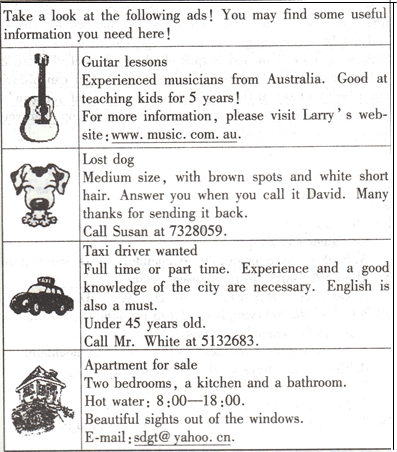
科目: 來源: 題型:閱讀理解

查看答案和解析>>
科目: 來源: 題型:閱讀理解
查看答案和解析>>
科目: 來源: 題型:閱讀理解

查看答案和解析>>
科目: 來源: 題型:閱讀理解
查看答案和解析>>
科目: 來源: 題型:閱讀理解
查看答案和解析>>
科目: 來源: 題型:閱讀理解
 |
查看答案和解析>>
科目: 來源: 題型:閱讀理解
查看答案和解析>>
科目: 來源: 題型:閱讀理解
| 10% Off Show this voucher(優(yōu)惠券)at the Book Store to get a 10% discount(減價(jià)) on any books you buy. We have lots of books to choose from, including children’s books, novels, travel guides and hobbies. You’re sure to find something that you will enjoy. |
| Assistant Wanted For a busy restaurant work on weekends. All meals are free. Call at 4323577 for more information. |
| Lost Cat Help me find my pet cat! She is 4 years old. She has long white hair and a long tail. Her name is Cathy. Call Carrie at 2853527. |
查看答案和解析>>
科目: 來源: 題型:閱讀理解
| Personal Data (個(gè)人資料) | |
| Name | Zhu Zhiwen |
| Age | 44 |
| Address | Heze , Shandong , China |
| Job | farmer |
| Called | Overcoat Brother(大衣哥) |
| Good at | singing |
| When and where to sing | 2011, Shangdong TV “I am a bigstar” |
查看答案和解析>>
科目: 來源: 題型:閱讀理解



查看答案和解析>>
湖北省互聯(lián)網(wǎng)違法和不良信息舉報(bào)平臺(tái) | 網(wǎng)上有害信息舉報(bào)專區(qū) | 電信詐騙舉報(bào)專區(qū) | 涉歷史虛無主義有害信息舉報(bào)專區(qū) | 涉企侵權(quán)舉報(bào)專區(qū)
違法和不良信息舉報(bào)電話:027-86699610 舉報(bào)郵箱:58377363@163.com